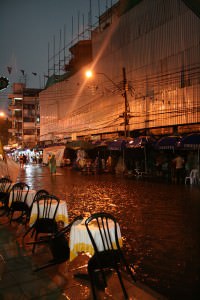Bangkok: From Backpacker Haven to Waterworld
Flood waters encroach upon Thailand’s captial, signalling the dangers of climate change
By: Roxanne De Souza, Staff Writer
As one of the most popular tourist destinations in the world, Thailand often evokes provocative imagery. Pristine white beaches. Delectable cuisine. Peaceful Buddhist temples. Unfortunately, this tropical paradise has also been afflicted with many natural disasters, the most infamous being the 2004 Indian Ocean Earthquake and Tsunami. The past month has seen the country through its most recent tribulation.
Monsoon rains resulted in severe flooding in the central and northern regions of Thailand. During the past several weeks, this has spread to other parts of the country. The water has slowly moved south, threatening the capital of Bangkok. The usually thriving metropolis has come to a standstill in many areas as entire neighbourhoods have been submerged. These floods are thought to be the worst experienced in decades, and have already resulted in hundreds of fatalities throughout the country.
The human consequences have been disastrous, with death and displacement afflicting various regions of Thailand. An exodus continues for thousands of Bangkok residents as the floodwaters inched closer to the city. Following weeks of uncertainty of how the flooding would affect the densest population in the country, parts of the city not yet affected are bracing for the worst. A combination of high tides and monsoon rainwater run-off threaten to widen the flooding rather than dissipating. This state of uncertainty is projected to last for at least another month.
[pullquote]
Many expect that situations like the flooding in Thailand will become more common around the world
[/pullquote]
For a country with an economy heavily reliant on tourism, the flooding has been detrimental to both the commercial and industrial sector. On one hand, travel restrictions and warnings have urged visitors to avoid Bangkok, in the face of an impending emergency situation. Many travellers have already altered plans in order to avoid the city, a situation that is forecasted to have a major impact on projected growth. With December and January traditionally being the busiest months for tourists to descend upon Thailand, it is still unclear if the flooding will comprise future tourism revenue.
The industrial sector has also been affected, with many plants and businesses experiencing damage or closing down in the face of uncertainty. Conservative estimates of flood damage to industry have been thought to be around $3.3 billion USD. Moreover, the Bank of Thailand has already downgraded protected growth for the fiscal year, expecting a significant recovery time for the economy following the floods. Environmental activists have argued that these extreme weather patterns are linked to climate change. Many expect that situations like the flooding in Thailand will become more common around the world – a growing concern for corporations that operate in vulnerable regions.
The backpacker haven of Thailand has temporarily become a no-go zone for travellers. As the major urban hub of Southeast Asia, it is unclear how the flooding will affect other countries in the region, particularly neighbouring states of Cambodia, Laos, and Vietnam. This flooding has the potential to be economically detrimental not just to Thailand, but for the entire region. The coming weeks will determine how the Government of Thailand and relief efforts must move forward in the aftermath of another disaster in paradise.
ARB Team
Arbitrage Magazine
Business News with BITE.
Liked this post? Why not buy the ARB team a beer? Just click an ad or donate below (thank you!)
Liked this article? Hated it? Comment below and share your opinions with other ARB readers!

























Share the post "Bangkok: From Backpacker Haven to Waterworld"